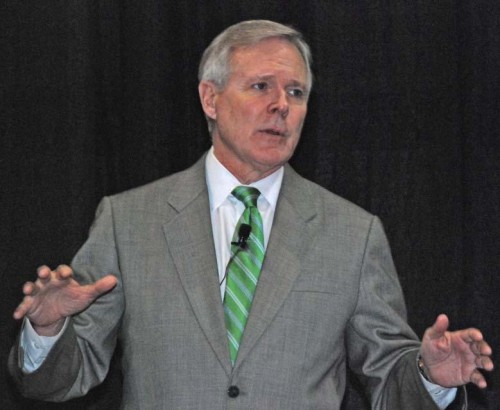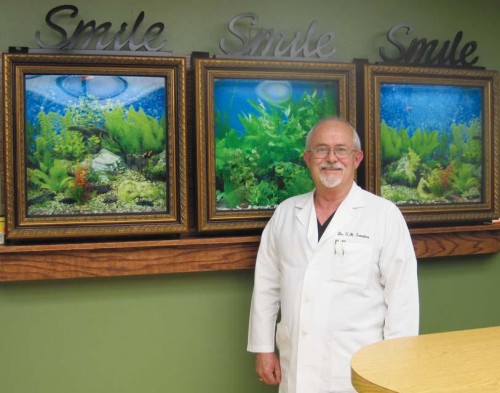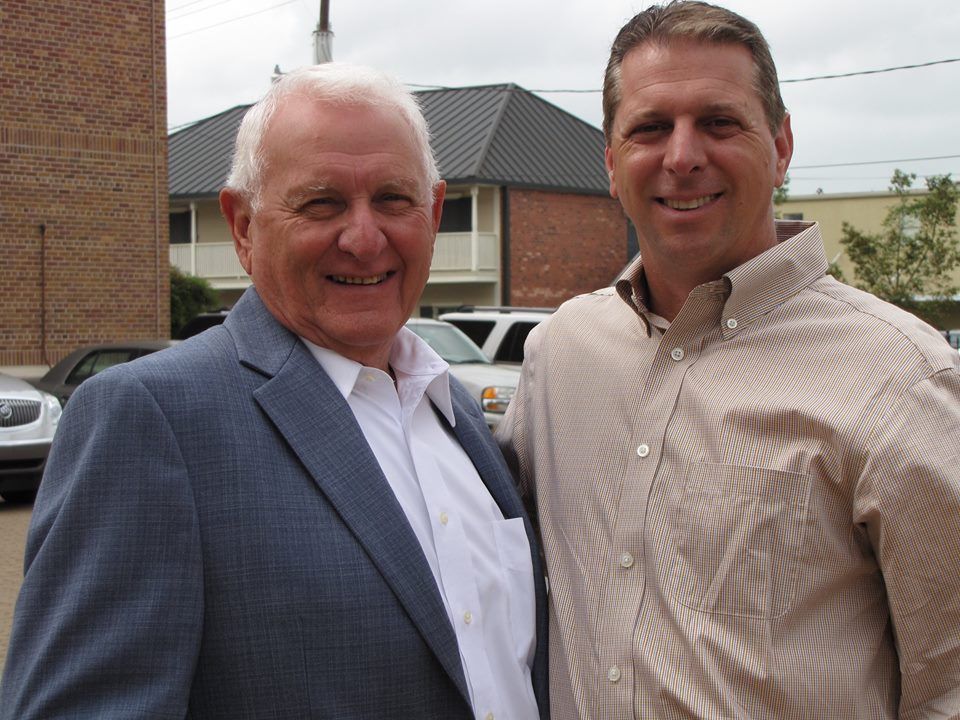
Protection vital for future, locals tell Mabus
August 17, 2010Back-to-school road safety tips for children and parents
August 19, 2010Picture this. You’re flat on your back and a masked figure with a sharp instrument is headed straight for you.
No, it’s not a horror movie but something that can be just as terrifying – a visit to the dentist’s office.
Dr. Samuel Sanders knows exactly how that feels. “I don’t like going to the dentist either,” the Houma dentist said.
“I was traumatized at age 6 with a ruptured appendix. I spent about three weeks in the hospital and they wouldn’t let my parents in except during visiting hours. It frightened me to death about anything medical. Even today I still have the same phobia,” Sanders said.
To calm his patient’s nerves and try to alleviate some of the anxiety, Sanders finds humor a good distraction. That, and educating his patients on what he’s about to do helps them become more at ease.
“I’ve been very fortunate that I’ve only ever had one tooth worked on,” Sanders admitted.
Years ago, the dentist suffered a broken tooth and knew it needed to be crowned. He was too afraid to have it worked on so he left it alone.
Some time later, his oldest son Jerrod – who had graduated from dental school just a year earlier – came home for a visit and asked if his father had fixed the tooth.
Before he could catch himself, Sanders said “no” and ended up on the other side of a dental drill.
“The whole time he’s drilling on me I thought I’ve never seen this kid work. I don’t know what kind of dentist he is. I was scared to death,” Sanders laughed.
Sanders grew up in the southeast New Mexico town of Artesia where the oil business has been a staple of the economy since the early 1900s.
“My dad migrated from Oklahoma to New Mexico in the late ’30s and settled in Artesia in 1939, so I guess I’m a transplanted Okie,” Sanders said.
He became interested in the dentistry profession while hanging out with a friend whose father was a dentist. He allowed the two boys to come by his office to empty the trash and clean up.
“I would look around and wonder what the equipment was all about,” Sanders said. “And then I would wander into his laboratory and see all the models and so forth and that’s really how I got interested.”
In the 1950s, a cousin graduated from Baylor College of Dentistry in Dallas.
“I idolized him and just always figured I’d go to dental school. I always thought that would be a neat profession to follow,” Sanders said.
Sanders graduated from Eastern New Mexico University with a Bachelor of Science in chemistry and a Masters in bacteriology. He also graduated from Baylor College of Dentistry in 1975.
“After graduation I told my dad, ‘I thought when I walked across the stage and they called you doctor for the first time that I would beam and be Dr. Sanders.’ Dad started laughing. He said ‘Son, that doctor in front of your name just means you went to school a lot longer. It doesn’t mean that you’re extremely smarter than anybody,'” Sanders said.
The young dentist spent the next 10 years practicing in Artesia until the oil business started to falter in the early ’80s. Things became tough in the small town with the population shrinking to about 13,000.
“I needed to go find something else to do, so I took off to Bedford, Texas and went to work for a company called The Interactive Medical Network,” Sanders said.
There, he traveled around the country creating continuing education programs for dentists and physicians but soon tired of living out of a suitcase and resigned.
“I had a cousin who lived in Houma. She knew I had time to kind of goof off a little bit and she said, ‘Why don’t you come down here and spend some time with us,'” Sanders recalled.
He only planned to be in Houma a couple of weeks, but the bayous and fishing began to rub off on him.
“I discovered redfish,” he laughed.
It was 1989 and the parish was experiencing a public school strike. The South Terrebonne High School principal asked if Sanders would teach chemistry for a couple of days.
“Who was to know the strike was going to last over three months? That really put my foot in the door down here because I was really enjoying the area,” Sanders explained.
Through a mutual acquaintance, he became friends with Houma dentist Dr. Merrick Dugal who was looking for an associate for his practice.
“He had had a lot of continuing education and I thought it cost a lot of money to get that education. I’ll learn everything he knows. Well he had a bad car wreck and three weeks later passed away,” Sanders said.
The New Mexico native decided to stay in Houma and run the dental practice for Dugal’s wife.
“She wanted me to have this practice and made me an offer I couldn’t refuse. Of course, the offer wasn’t too hard to accept because of the redfish, the area, and I love the food,” Sanders said.
He has continued to build the practice ever since, covering all the bases of dentistry – extractions, fillings, crowns, bridges, removable partials and dentures.
“When I started we had two rooms working. We now have five operatories with all new equipment,” Sanders said.
Many more changes have occurred during the years. Digital x-ray has brought sharper images of teeth making examinations of each tooth more precise.
The equipment is more streamlined and petite making it more comfortable for the patient.
“The hand pieces have gotten lighter and smaller. They’re coming out with electric hand pieces that don’t make all that noise,” Sanders said.
Digital impressions are the newest technology on the horizon.
“They take a picture of the inside of your mouth, send the image to a lab and mill your model. They’re already doing it for crowns,” Sanders said.
Of course, prevention is preferable to getting a tooth repaired or replaced.
The Houma dentist has advice on keeping teeth healthy.
“Thirty-five years ago we used the stiffest, hardest brush you can find. Now we’ve discovered that wears the enamel off your teeth. So now we recommend soft toothbrushes with rounded bristles,” Sanders explained.
Sanders also recommends brushing and flossing daily as well as cutting back on sugar.
“One thing we see a lot of is people drinking sodas all day long. If you’re drinking a soda, that bubbly sugary syrup is getting in between every tooth. And if you’re sitting there drinking sodas all day long, you’re continuously bathing your teeth in sugar,” he said.
Another danger to teeth are tongue studs. Sanders explained they chip the enamel off the backsides of front teeth. He’s also seen porcelain crowns cracked and broken with studs.
“When I got out of dental school, all we did for crowns in the back was make them out of gold. That’s actually the best material because it won’t break, bend or splinter,” Sanders said.
Sanders also has advice for parents about baby teeth.
“Baby teeth are there to help children learn how to speak, get nutrition as well as saving space in their developing jaws for their permanent teeth,” he said.
If baby teeth aren’t taken care of, the child may lose them too soon. This results in improper alignment of permanent teeth later on.
“You take out a baby tooth too early and next thing you know the permanent teeth aren’t coming in right. They come in crooked,” he said.
Too much sugar, poor dental hygiene, chewing ice and playing sports can make life dangerous for the average tooth.
There’s danger out there for the dentist as well.
It’s called the biter.
“After 35 years you’re bound to be bitten once or twice. Most people who bite you are numb. They don’t know they’re biting you but I’ve had several just bite the heck out of me. You just shake it off and go on,” Sanders said.
As with so many local businesses, the economy has Sanders’ practice seeing a decrease in elective procedures.
As the regular load of insurance patients goes down, the practice has been able to open its doors to more Medicaid patients.
“We see a lot of KIDMED – Medicaid for Children. There’s not a lot of people that take that in town. We’ve always felt like you need to do your part in the community, so we’ve always taken KIDMED,” Sanders said.
“I’ve done some gratus work which I think every dentist should. You have people who come in and you know there is no way they can afford things. I think if it’s in your capacity to help them, you shouldn’t turn them away,” Sanders said.
A couple of years ago Sanders was planning on retiring to Oklahoma, but things changed when his youngest son Kevin went back to school to become a dentist.
“He wants to come here, so we’ll stay and practice together for four or five years maybe. Of course with him living right here – he loves to fish and hunt too – we’ll probably stay here,” Sanders said.
“What I would call retirement is coming in only about two days a week and throwing my weight around, being the PR man and greeting people out front. All the fun things in dentistry,” Sanders laughed.
He’ll let his son do the hard work.
Dr. Samuel Sanders was one of Crest’s original “four out of five dentists” in a 1980’s study on tartar control. Today his practice offers a full range of “good, old-fashioned dentistry” while catering to cowards. JENNIE CHILDS













